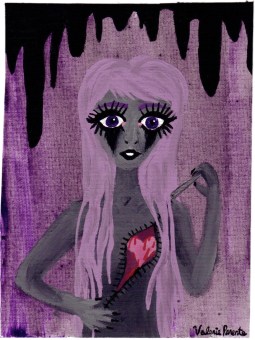Why is it so much easier for me to write from the point of view of a male? In Touch, being the third story I’ve completed, was by far the most effortless piece I’ve written to date. One could claim this is because the themes of In Touch were purely an autobiographical experience against the backdrop of a fiction story. The odd but magical part of writing this book, though, laid in the fact that I was writing about obsessive compulsive disorder from an outsider’s point of view… a male’s point of view. Sitting in this Starbucks, for the second Sunday in a row, now writing scenes for another story through a male narrator, I find myself asking the question- why is writing from a male’s perspective so much easier for me? My guess is that it has something to do with the prisons we call ego and expectations.
If you’ve read any of my poetry and prose work then you’ll quickly realize it is no secret that I am extremely tied to my female identity. So you would think I would write more effortlessly from the female point of view, but from a personal standpoint that just doesn’t feel like the case.
In Touch was honestly the easiest book I’ve written to date. Was it the “best”? I don’t know. But it was certainly less difficult. Most notably, it was effortless. The words flowed from my brain with no hesitation. I barely had to think. I just wrote. I remember lying in bed scribbling dialogues between the main characters, Jef and Lacey, with no interruption of thought. I remember phrases and comments popping in my head when I was working my retail job and jotting them down on scrap pieces of paper. Many brief but key comments unraveled into beautiful chapters and concepts that I genuinely do not feel took any brain power. They just popped into existence and my mind acted as the translator between wherever art spawns and where it is destined to be recorded. Bringing my daily thoughts and imaginary conversations alive on paper was as easy watching TV.

Writing as a person who is so obviously not me, that being a young man, brings no pressure. There’s no ego conflicts or stress to “get it right”. Any expectations I have on the identity I project to the world is irrelevant. All that matters is writing meaningful passages. The ego that haunts “Valerie” is no longer in control. It really is freeing. I imagine this kind of disconnect from the self but connection to the collective consciousness that is the rest of the world is what it is like to feel free. And for this reason I think I not only have a more effortless experience purging the words on paper through a male narrator’s voice. The idea that it is easier to write as somebody who is not me is rich with irony, and that fascinates me more and more every day.
When I have writer’s block I look at that 488 page novel and wonder how the heck I did that. Then at moments like today when I started writing from another male narrator’s perspective new words flowed instantly and I remembered what it was like to be inspired.
Yes, I identify with all my narrators to some extent. We do share the same brain after all. But there’s something flawless and liberating about writing without Val’s ego and Val’s expectations breathing down my throat. No interruptions. It’s easier to write and write and write until the thoughts dry out. I feel more “natural” writing as a different gender and identity, and I think that’s why In Touch came out exactly as I dreamed it would.
To purchase In Touch you can go to Amazon.com!
 The entire universe and its blessings are in the palm of my hand by Valerie Parente
The entire universe and its blessings are in the palm of my hand by Valerie Parente





